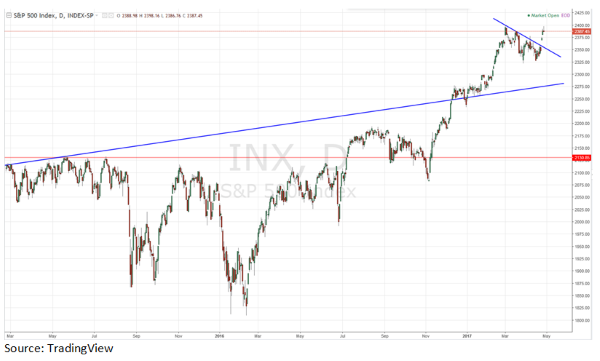'Trump trade' and the first 100 days
28th April 2017 16:15
by Lee Wild from interactive investor
Share on
Pinch yourself, we made it! Less than six months since we wrote Why Donald Trump will win the US election, and despite prophecies of Armageddon should he win the presidency, the sky did not fall down. Life goes on, and Trump celebrates 100 days in office on Saturday 29th April. In fact, investors have never had it so good.
Predictions that stock prices would plunge by at least 10% if Americans picked the property billionaire and TV presenter for the White House, couldn't have been more wrong.
The widely-followed Wilshire 5000 index is up over 12% since election night November 8th, increasing the wealth of investors by over $3 trillion. In the three months following Trump's inauguration it's 5%, or $1.3 trillion.
And over here, both the FTSE 100 and FTSE All-Share have risen as much as 9% since. The blue-chip index peaked last month at a new record high of 7,447, and the All-Share at 4,047. For the more speculative AIM index, it's more like 20%!
True, the so-called 'Trump trade' has less oomph now, but there's no rush to sell, either. There will be a correction at some stage, we know that, but with Treasury Secretary Steven Mnuchin labelling latest IMF forecasts for US economic growth of 2.5% next year a "little conservative", it might not be soon.

A big concern in the run up to the election, before his inauguration on 20 January, and ever since, has been Twitter-fan Trump's lack of experience as a statesman. He spent his first weeks in the job handing out executive orders like confetti, but neither he nor most of his team have any significant political experience, one of the reasons he beat Hillary.
As I write, Trump and his team are horse-trading to get a spending bill agreed by Congress and avoid a government shutdown. A one-week extension is currently most likely, although failure here could see a repeat of 2013 when government was paralysed for 17 days.
And there have been slip-ups already.
Courts overruled his controversial immigration ban and Congress blocked an attempt to reform Obamacare. It looks like the Mexicans will not pay for "that effing wall", either, and there's no guarantee that Trump's latest promise – to cut the marginal corporate tax rate to 15% from 35% (the effective tax rate is more like 28%) - or for a $1 trillion building boom, will succeed.
Even if he does get tax cuts past lawmakers – and Democrats will offer stiff resistance – few think it'll be anything like 15%, which Washington-based think tank the Tax Foundation says will cost $2 trillion over 10 years
Hope here is that cuts will boost economic growth to around 4% and beef up company profits. The American private sector might smell blood, too, argues Panmure Gordon's chief economist Simon French, if government is forced to cut spending to bankroll tax reform. Corporates will rush to fill the gap.
A cut of this magnitude would seriously increase free cash flow to corporate America, boosting enterprise value and the value of equity. Incentives for US firms to repatriate cash "trapped" overseas - Apple has foreign cash of $187 billion - would also stimulate investment, share buybacks, dividend payments and M&A.
Of course, where tax is concerned things are never that simple, and French expects "much smaller potential for stimulus than is currently priced in for risk assets". But the possible benefits make it obvious why this is such a big deal.
Keeping the markets guessing
Upshot for markets, however, is that no one really knows what the most unpredictable president in modern American history can achieve, or how he'll react to new situations, particularly on the international stage.
Sure, Trump has survived his first three-and-a-bit months, but the rest of his four-year presidential term is not without risk. He's currently waging a proxy war with the Russians in Syria, is going toe-to-toe with Kim Jong–un on the Korean peninsula, threatening the Chinese and dropping the 'mother of all bombs' in Afghanistan.
"In my view, his protectionist agenda will only hurt the US consumer and economy," warns John Husselbee, head of multi-asset at Liontrust.
Possibly the greatest test will, if history is any indicator, be an almost inevitable recession sometime in the next three years. It's a problem faced by every post-war American leader who's followed a two-term president, and this cycle is mature.
But we talked to City commentator David Buik just recently who thinks Trump might get away with it. If he does deliver on tax and infrastructure, "it would be very silly to write off US equities," he tells us.
"When you get interest rates up to 4 and 5% and the economy suddenly finds it can't afford it, then you're talking about a recession.
"Because we're at a low level of interest rates and they're unlikely to go up significantly in the next two or three years, the chance of a recession in the next four or five years is pretty remote."
That's great news, not just for Trump's presidency and the American people, but also for the rest of us. Remember, if America goes down, we all go down.
Near-term, however, it's about tax cuts and infrastructure. Get them both through Congress without too much tinkering and a fresh leg of the reflation trade is almost inevitable.
For more ideas about how to play it, read here.
This article is for information and discussion purposes only and does not form a recommendation to invest or otherwise. The value of an investment may fall. The investments referred to in this article may not be suitable for all investors, and if in doubt, an investor should seek advice from a qualified investment adviser.